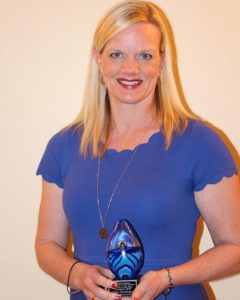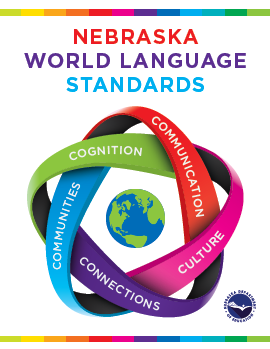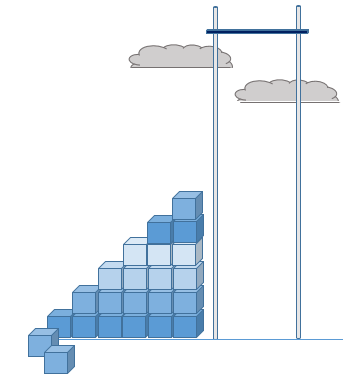Meet Your NILA Board: Exhibit Chair and NAATF President Cara Heminger
 Cara Heminger
Cara Heminger
Department Chair, World Languages, French Teacher
Lincoln North Star High School
caraheminger@gmail.com
What was your motivation to become a language teacher?
My teachers in junior high and high school, Madame Peggy Ruch and Madame Susan Liden in Willmar, MN, were so enthusiastic about teaching us French that I fell in love with the language and culture the first time I sat in their classes. I took a European tour with them as a junior, then backpacked through Europe after college. I became an Assistante d’Anglais in Paris and then got my MA in French Literature. After, I knew I wanted to spend my life sharing my love for learning about other languages and cultures. Being a French teacher lets me share my passion each day!
Describe your classroom approach in five words or less.
Creating lifelong learners, challenging, inclusive.
What would you recommend to educators to build their pedagogy and practice?
I recommend that an educator approach their life and their teaching career with a positive attitude of learning from every experience. We can learn from each other as language teachers, from our students, from our administrators, from brand new teachers, from veteran teachers, and even from our experiences in the community. Take on every experience — every meeting, every class we take or teach, every interaction with someone new — with a curiosity for learning and for being empathetic. I believe we gain so much to broaden our own horizons when we approach our lives that way. This translates to our own teaching when we glean from others what will work with our different students and topics.
World Language Standards FAQs: A Conversation with the WL Specialist
The 2019 World Language Standards have been in place less than a week but there are many excited to know more about the document and the process. Below are some of the questions that have been asked regarding the new Nebraska World Language Standards. Got a question? Email stephanie.call@nebraska.gov.
What do the standards tell teachers to teach?
The Nebraska World Language Standards do not determine vocabulary, grammar, cultural content, or other static concepts. Instead, the standards focus on what students do with the language. These are proficiency-based standards, meaning students will demonstrate the knowledge and skills they learn in the world language classroom.
When will teachers be expected to create new curriculum?
There is no immediate pressure to create new curriculum. The Frameworks Implementation Guide suggests using this year to evaluate the curriculum that is in place. A comparison of the current curriculum and the standards may, or may not, reveal areas in need of strengthening. Once a thorough assessment is completed, districts will better know if a new curriculum or resource materials would be beneficial.
Why did ‘cognition’ replace ‘comparisons’ as one of the ‘Five C’s’ or world language strands?
The team decided that comparisons is inherent in everything. We compare products, perspectives, and practices in order to make meaning. We compare language as we learn structure. Eventually, we decided that it is a process that belonged in our indicators for every key area. As for the cognition piece, several members of the team brought experience with LinguaFolio, integrated performance assessments, or metacognitive research. We decided that this was a component that had to be included. Much of our state-wide community has long worked on what the teacher should do in the classroom. What better way to drive home the “I Can” than to make it a standard?
Wanderbus Coming to Deutschlandjahr at Bellevue West
The “Wanderbus” is coming to Bellevue West on September 20 from 10-12 for the Deutschlandjahr. The Wanderbus travels the United States, meeting people in their hometowns to share about their German heritage, about Germany, and about US German connections. The program is sponsored by the Goethe Institute in Washington, D.C. Spots are still available. Contact Amanda Messerschmitt at Amanda.messerschmitt@bpsne.net if interested in bringing your students.
Nebraska World Language Standards Approved
 On September 6, 2019, the Nebraska State Board of Education approved the Nebraska World Language Standards. Culminating twenty months of research, discussion, brainstorming, and honing, the Standards present a framework for teaching and learning in second language acquisition at a level that encourages us to reach above, to go beyond, and to be reflective in practice. To view the Nebraska World Language Standards online, please visit the Nebraska Department of Education World Language Standards page.
On September 6, 2019, the Nebraska State Board of Education approved the Nebraska World Language Standards. Culminating twenty months of research, discussion, brainstorming, and honing, the Standards present a framework for teaching and learning in second language acquisition at a level that encourages us to reach above, to go beyond, and to be reflective in practice. To view the Nebraska World Language Standards online, please visit the Nebraska Department of Education World Language Standards page.
Note of Appreciation
Thank you to everyone who helped with this process by providing expertise, resources, time and dedication. I look forward to sharing more about the standards at the NILA Conference October 11-12 in Kearney.
Cognitive Benefits of Language Learning
This summer, I traveled to Spain on a scholarship to the University of Valladolid’s professional development seminar for teachers of Spanish. There I met educators from around the world. I was struck by the tendency of world language teachers to be bold, adventurous, adept at wordplay, precise in expression, and creative in problem solving. In fact, I’m convinced that the cognitive structuring from our language studies actually made us better travelers. Every attention was paid to details, comparing, contrasting, problem-solving, and negotiating. Our language learning not presented the ability to communicate in Spain, it awarded us a greater level of understanding and learning from the experience.
Stephanie Call, World Languages Specialist ♦ 402-471-4331 ♦ stephanie.call@nebraska.gov
Calendar of Events
♦
Omaha’s Original Greek Festival
Omaha
August 16
♦
St. Stanislaus Polish Festival
Omaha
August 18
♦
Intercultural Senior Center World Bash
Omaha
August 22
♦
México en el Corazón
Grand Island
August 23
♦
La Festa Italiana
Omaha
August 30
♦
Fiestas Patrias 2019
Omaha
September 13-15
♦
Nebraska Hispanic Festival
Lincoln
September 14
♦
Thriving Children, Families, and Communities Conference
Kearney
September 16
♦
Tango with Tusks Argentine Tango Workshop
Lincoln
September 20
♦
135th German Day-Oktoberfest
Omaha
September 20-21
Please email event information to
stephanie.call
@nebraska.gov
2019 NILA Conference Update: Free Workshop and Conference Events
2019 NILA Conference
Raising the Bar: Nebraska’s New World Language Standards
October 11-12, 2019
University of Nebraska Kearney
- Free Half-Day Workshop
- 25 Professional Sessions
- Lunch and Keynote
- Awards Ceremony
- Vendor Exhibits
- Association Meetings
- Opportunities to Network
- Door Prizes
- Stuff Swap
- (Bring items to exchange)
Friday Workshop with Keynote Presenter Stephanie Call
World Language Specialist Stephanie Call will introduce the new standards with activities, resources, and methods that are meant to provide practical and effective strategies to meet the bar. Come prepared to participate, to share, and to learn. Expect to have fun. Standards implementation packets will be provided to those in attendance.
The Friday workshop is available at no cost. It is from 1:00 to 4:00 in the Sandhills Room on the first floor of the Nebraskan Student Union. Pre-registration is preferred. Visit http://www.nebraskalanguages.org/2019-fall-conference.html.
Nebraska Welcomes New German Language Advisor
Recently, Nebraska welcomed a new German Language Advisor of the Central Agency for Schools Abroad in Nebraska, Leeni Martinkari will be taking over the role of Irene Mrázek, who has returned to Germany.
Could you please describe your background?
After graduating from Freie Universität Berlin and obtaining my teaching degree in German and English, I later added Theatre Studies and received my teaching certificate for School Theatre as well.
My latest teaching post was at an Upper Secondary School in Berlin-Weissensee, where I taught German, English and Performing Arts for eleven years, often adding some spark to my language classes using theatre methods. From 2014, I also taught refugee-classes, which were established in many Berlin schools that year. I was also responsible for the school’s contacts abroad and coordinated the students’ annual study-trips and internships to various European countries. I left the teaching profession in 2016 to work as a German Language Advisor in the region of Ohio, Michigan, Indiana and Kentucky.
What is your role as a language advisor?
I offer guidance for schools that wish to establish a DSD-program (German Language Diploma). I provide professional development workshops for teachers, workshops in cooperation with AATG, professional coaching in cooperation with the Goethe Institute, fun German workshops for students, information on studying in Germany, and every now and then workshops for students with German artists (music or theatre), when these are funded by the German Government. I am looking forward to working together with colleagues in Nebraska, promoting and supporting German language programs.
What is your contact information?
columbus@auslandsschulwesen.de
Chansons Françaises en Nebraska
If you are interested in hosting a French singer in your school, this coming Fall, Eric Vincent will perform in your area during mid-November. Eric Vincent’s songs are included in several major textbooks such as “Discovering French Today”: Blanc (Level 2) by Valette and Valette (Houghton Mifflin Harcourt), “SAM Contacts: Langue et Culture Françaises, 9th edition” by Valette and Valette (Heinle Cengage). If interested, contact Marie Claude Barbin at marieclaudebarbin@orange.fr. There are still availabilities and we propose a sharing receipts formula allowing the organizer to host a concert without financial risk. Please visit the Eric Vincent website.
World Language Standards Update: August 2019
Editors met in July to review the results from the Public Input Survey that was available from May to June. In response to the results of the survey, the language of the indicators was clarified to provide more clear and specific learning targets. Specific examples were also provided to support focus groups of language for heritage speakers and for classical languages.
The final draft of the standards was presented at the August meeting of the Nebraska State School Board for a first review. Two individuals spoke during the State Board’s public commentary period. Mary Lea Free, Spanish teacher at Norris Public School, read a statement of support from colleague Jacqueline Mohr, Syacuse Dunbar Avoca Schools. Mrs. Mohr wrote, “With the adoption of these standards, the Nebraska Department of Education is ensuring the world language education in the state remains one of the top in the nation while producing students who are 21st Century global learners.” Mrs. Free added, “The proficiency levels are well explained. They use a common knowledge that all of our teachers in Nebraska will relate to and use in the classroom.” Rebecca Gill Rose, Bennet Palmyra Public Schools Spanish teacher, presented to the Board that, “Today’s world language classroom is about real-world production of language and global awareness. These proposed standards speak to this.”
It is hoped that the State Board will adopt the standards at the September 2019 meeting. The final draft can be accessed on the World Language website.
Standards Workshops Coming Soon to Your ESU
The Revised Nebraska World Language Standards offer a greater emphasis on language production, global perspectives, and ownership in language learning. The NDE World Language Education Specialist offers an opportunity to talk about the revised world language standards and their potential impact to districts, to develop standards-based activities, and to collaborate with peers. Expect a fast-paced day with practical ideas, rich discussions, and a wealth of resources. Please enroll through the Educational Service Unit.
| ESU 1 | 21 Apr 20 | ESU 8 | 24 Apr 20 |
| ESU 2 | 22 Apr 20 | ESU 9 and 10 at ESU 9 | 16 Oct 19 |
| ESU 3 | 19 Feb 20 | ESU 11 | 07 Oct 19 |
| ESU 4 | 14 Feb 20 | 14 Nov 19 | |
| ESU 5 | 03 Oct 19 | ESU 13 | 12 Mar 20 |
| 20 Feb 20 | ESU 16 | 11 Mar 20 | |
| 05 Mar 20 | ESU 17 | 10 Mar 20 | |
| ESU 6 | 24 Oct 19 | OPS | 20 Sep 20 |
| 03 Mar 20 | |||
| ESU 7 | 23 Apr 20 |
Cognitive Benefits of Language Learning
As language educators, we can enumerate the cognitive benefits of language learning without thinking twice. However, this list of benefits does not often have its desired impact in advocacy. Our messaging regarding the cognitive benefits of world language learning can change. In debate terminology, we need the “link, brink, and impact”. The link is how we benefit from language learning. The brink is how these benefits could be generally beneficial. The impact is the ultimate consequence and must be tied to what matters to us most: basic, psychological, and self-fulfillment needs. Consider relating that list of benefits in terms of how each one has a personal impact on the daily life and expectations of your students. This compilation shows the link, brink, and impact of how language has cognitive benefits that affect us personally.
Meet Your NILA Board: Secretary Dr. Jonathan Dettman
Dr Jonathan Dettman, Secretary
Associate Professor of Spanish,
University of Nebraska Kearney
dettmanjc@unk.edu
What was your motivation to become a language teacher?
My experience as a college student was very positive and personally transformative. A big part of that was learning languages. I had a great deal of admiration for the teachers who had been my intellectual guides, and when I finished college, I contemplated becoming a Spanish teacher. I ended up taking the long route to teaching (through graduate school), but I think post-secondary education is a very good fit for me.
Describe your classroom approach in five words or less.
“I bet you didn’t know…”
How do you feel Nebraska is raising the standards for world language education?
Both NILA and NDE are very conscientious about staying informed about best practices and promoting them throughout the state. Since arriving in Nebraska in 2013, I’ve been impressed by the overall level of professionalism and commitment to teacher education.
What would you recommend to educators to build their pedagogy and practice?
Take time for professional development, even if that means organizing workshops and idea sessions for your colleagues–maybe you’re the teacher you’re looking for.
Calendar of Events
♦
¡Visítanos! Tour en Español
Zipline Brewing Co.
Omaha
July 6
♦
GermanFest 2019
Syracuse
July 13
♦
L’Alliance Francaise Bastille Day Celebration
Omaha
July 14
♦
Second Nebraska Asian Festival
Omaha
July 27
♦
Nineteenth Century French Art
Joslyn Art Museum
July 27
♦
Tanabata Summer Party
University of Nebraska Lincoln
July 31
♦
Wilber Czech Festival
Wilber
August 2
♦
Lincoln Crossroads Music Festival
Lincoln
August 5-11
♦
Omaha’s Original Greek Festival
Omaha
August 16
♦
Nebraska Hispanic Festival
Lincoln
September 14
Please email event information to
stephanie.call
@nebraska.gov



